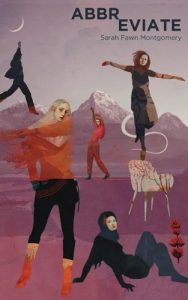
Review by Jami Macarty
In Abbreviate, Sarah Fawn Montgomery skillfully examines the myriad ways girls are conditioned to “shrink smaller” so boys can “get bigger.” Through interconnected lyric micro-essays, she reflects on how small, often overlooked or downplayed experiences accumulate into a multilayered life-narrative of diminishment that demonstrates what girls face in various environments, including homes, schools, literature, and video games. Montgomery sensitively and candidly addresses domestic violence, casual intimidation, and sexual assault, revealing the double standards and dismissive attitudes that permeate these spaces.
Starting from middle school and continuing to college, Montgomery illustrates the pervasive nature of misogyny, particularly within educational settings. Both male and female authority figures perpetuate pressures to conform and perform that lead girls to harm themselves, as they struggle with unrealistic standards for their bodies. The title essay places this theme in sharp relief.
In “Abbreviate,” Montgomery uses the situation of female students sharing the same name — “we Sarahs are too many” — to illustrate how girls are forced to adapt for the convenience of their teachers: “When our names are … replaced with a letter, we become small like our bodies, a period at the end to signal that the decision is not ours.”
Despite the awful predicament of this “endless cycle,” some essays celebrate the “small miracles” of female friendship: A refuge where girls can “tend to what haunted” and “heal hurts no one would see or believe.” The saving support of aunts, sisters, and friends helps shift their focus from looking down to “up at the stars.”
By speaking out to “constellate our collective hurts,” girls can escape oppression and reclaim their stories as “someone seen … someone believed.” As Sarah Fawn Montgomery’s essays navigate the patriarchal landscape particular to American culture, a woman emerges with “Strength newly summoned,” understanding herself and her place in the world. Abbreviate is a necessary and resonant book.
Abbreviate by Sarah Fawn Montgomery. Small Harbor Publishing, May 2025.
Reviewer bio: Jami Macarty is the author of The Long Now Conditions Permit, winner of the 2023 Test Site Poetry Series Prize (forthcoming University of Nevada Press), and The Minuses (Center for Literary Publishing, 2020), winner of the 2020 New Mexico/Arizona Book Award – Poetry Arizona. Jami’s four chapbooks include The Whole Catastrophe (Vallum Chapbook Series, 2024) and Mind of Spring (Vallum Chapbook Series, 2017), winner of the 2017 Vallum Chapbook Award.


